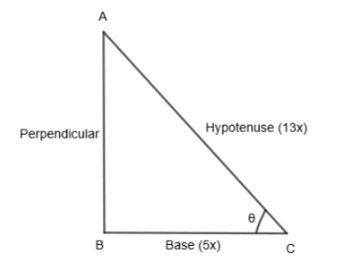Question
Question: If \[\cos \theta =\dfrac{5}{13}\], find the value of \[\dfrac{{{\sin }^{2}}\theta -{{\cos }^{2}}\the...
If cosθ=135, find the value of 2sinθcosθsin2θ−cos2θ×tan2θ1
Solution
Hint:First of all consider a triangle ABC with C as the angle θ. Now, use the Pythagoras theorem to find the remaining side. Now, find sinθ=HP and tanθ=BP and substitute in the given expression to get the required answer.
Complete step-by-step answer:
Here, we are given that cosθ=135. We have to find the value of 2sinθcosθsin2θ−cos2θ×tan2θ1.
Let us consider the expression given in the question.
E=2sinθcosθsin2θ−cos2θ×tan2θ1....(i)
We are given that,
cosθ=135....(ii)
We know that,
cosθ=HypotenuseBase....(iii)
From equation (ii) and (iii), we get,
135=HypotenuseBase
Let us assume a triangle ABC, right-angled at B and angle C is θ.

Let base BC be equal to 5x and hypotenuse equal to 13x. We know that Pythagoras theorem states that in a right-angled triangle, the square of the hypotenuse side is equal to the sum of the squares of the other two sides. So, in the above triangle ABC, by applying Pythagoras theorem, we get,
(AB)2+(BC)2=(AC)2
By substituting the value of BC = 5x and AC = 13x, we get,
(5x)2+(AB)2=(13x)2
25x2+(AB)2=169x2
(AB)2=169x2−25x2
(AB)2=144x2
AB=12x
We know that,
sinθ=HypotenusePerpendicular....(iv)
In triangle ABC, with respect to angle θ,
Perpendicular = AB = 12x
Hypotenuse = AC = 13x
By substituting these values in equation (iv), we get,
sinθ=13x12x=1312
We also know that,
tanθ=BasePerpendicular....(v)
In triangle ABC, with respect to angle θ,
Perpendicular = AB = 12x
Base = BC = 5x
By substituting these values in equation (v), we get,
tanθ=5x12x=512
Now, by substituting these values of cosθ,sinθ and tanθ in equation (i), we get,
E=2sinθcosθsin2θ−cos2θ.tan2θ1
E=2.(1312).(135)(1312)2−(135)2.(512)21
E=169120(169144−16925).(14425)
E=169120(169144−25).(14425)
E=169119×120169×14425
E=120119×14425
E=24×144119×5
E=2736595
So, we get the value of 2sinθcosθsin2θ−cos2θ×tan2θ1 as 2736595.
Note: In this question, students can also find sinθ by using sin2θ+cos2θ=1. After getting sinθ, students can find tanθ by using tanθ=cosθsinθ. Also, students must keep in mind that when nothing is given about the angle, we should always consider it in the first quadrant, i.e between 0 to 2π and in this case all trigonometric ratios would be positive.Students should remember important trigonometric ratios for solving these types of questions.
